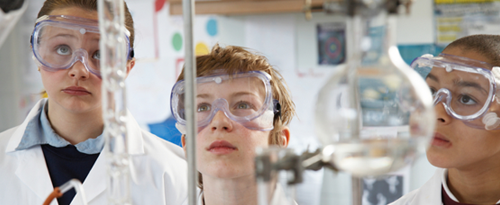Dowsing at the Royal Institution
To London for OCR’s launch of the practical endorsement component of the new A level specifications last month. In fact the event was held at the Royal Institution and you don’t get venues  much more appropriate than that to talk about the recognition of investigative science.
much more appropriate than that to talk about the recognition of investigative science.
What came across strongly was the sense that no-one (and there was a fair range of stakeholders present) is questioning whether or not students should do practical science, whether teachers should support them in developing practical skills or whether it can make a real contribution to young people’s scientific understanding. OK – if you did doubt it you probably wouldn’t voice those views there, but I don’t actually think anyone does.
There were several very good speakers, including Tim Oates who really challenged us to think about what the role of practical work is. As he pointed out, it’s often used to get students to ‘work like a scientist does’. In fact, as he pointed out, working like a scientist can be tedious, frustrating and repetitive. It is “not a whirlwind dance of excitement, illuminated by the brilliant strobe light of insight”. The journey to this realisation for the research scientists of tomorrow better not be too rapid, less they take fright. Education needs to be managed – but we know that. Practical work for many students needs a subtly different role.
Steve Jones, Director of CLEAPSS, made a similar point, in a different way. The question is not so much “Are you doing practical work with your students?” as “How are you using practical work?” The gain in learning is not directly proportional to the quantity of equipment requisitions entered. Neither, in fact, should it be assumed to automatically relate to student satisfaction. He shared a quote from a student that took me back a decade; it’s done the rounds, having been used originally in National Strategies training. It goes something like this: “Whenever the equipment appears in a lesson, my heart sinks. Either the experiment will work, thus proving what we’d already been told, or it won’t, in which case there’s hell up trying to explain what went wrong.” Of course there’s a role for practical work used this way, but let it not be the only role. (He also produced a pair of dowsing rods and described how he’d used them to engage some experienced scientists in thinking about experimental design – “We know it’s bogus – now prove it.” Is this the first time such equipment has been used there?)
Steve’s two favourite questions (mine too) when observing a practical lesson, are “What are you doing?” and “Why are you doing it?” Often the ‘hit rate’ on the first is high, the second rarely so. We need to be clear about what the intended impact on learning is and then see if that’s what’s happening.
The changes to practical assessment in A level sciences should be used to revisit why we get students to do practical science, and not just whether we do. As Professor Robin Millar would say – it’s hands on but is it minds on?
Ed Walsh
Ed is Series Editor for Collins Key Stage 3 Science and a Science Consultant for Cornwall Learning


